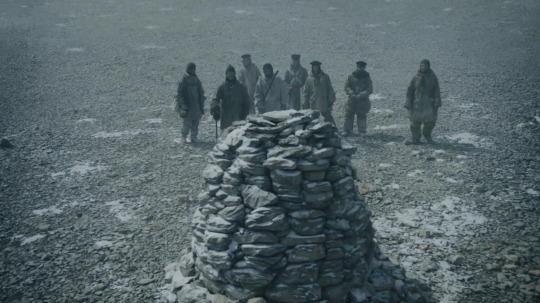#not quiiite as much trivia for this one but hey!
Text
The Terror Trivia: Episode 2
The second part of my series of “pop-up” trivia posts for first-time (and repeat) watchers of The Terror S1. Here’s your guide to “Gore” !
(I’m using the timestamps on my download, which may not line up to other versions online).

[00:57] Terror and Erebus were not originally built as steam-powered ships. They were retrofitted, per Admiralty orders, after they returned from Antarctica with engines that had been previously used to pull trains.
[01:54] The book that John Bridgens lends to Henry Peglar is the comedic novel The Vicar Of Wakefield—the only non-devotional book recovered from the remains of the expedition by searchers in the 1850s.
[03:19] Lieutenant Graham Gore had previously been to the Arctic on Captain George Back’s ill-fated expedition to Hudson Bay in 1836. Terror was severely damaged by ice and nearly sank on the way back to Britain.
[07:38] Sir John Franklin was known as a “blue-light” Captain. Such officers were forward with their religious beliefs, and were more common in the Navy from the Napoleonic wars onwards as evangelism rose in Britain as a whole.
[08:20] The seat of ease is the private toilet in a captain’s Great Cabin. The privy that the other crew members use is known as the “head.”
[11:38] “Seventeen years. Maybe it spooks them.” In 1830, 17 years previously, James Ross built this cairn during overland explorations conducted while the Victory was trapped in the ice.
[15:38] Sodomy was prohibited in the Royal Navy per the Articles of War, and theoretically was punishable by death. Lashing (whipping) was a common punishment that could be carried out on board ship.
[21:01] Sir William Edward Parry was a legendary polar explorer who lead four expeditions to the Arctic between 1819 and 1827. Crozier was on the second, third and fourth expeditions; Thomas Blanky was on the fourth; and James Clark Ross was on all four.
[30:48] The Royal Navy has a set of traditional toasts, one for each day of the week. For example, Thursday’s is “A bloody war or a sickly season,” Saturday’s is “Our wives and sweethearts,” and Wednesday’s is “Ourselves.”
[33:34] Crozier speaks Inuktitut thanks to his time spent on Parry’s second expedition wintering over at Igloolik, where the crew members were in close contact with nearby Inuit.
75 notes
·
View notes